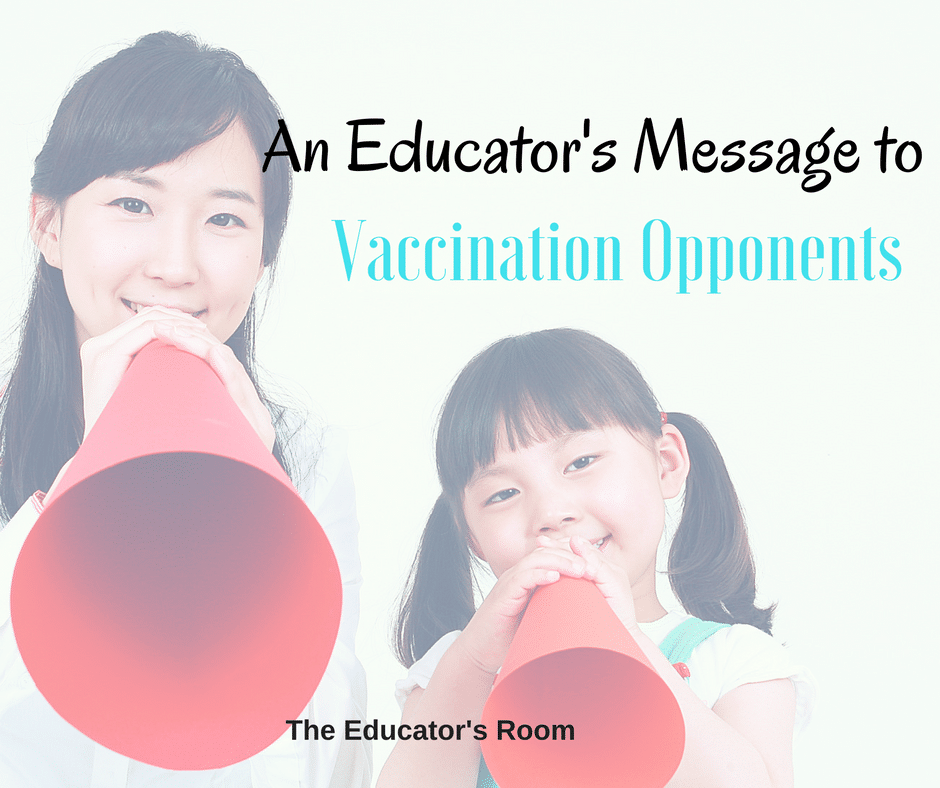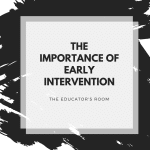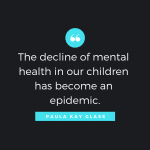A few days ago, I heard some loud noises coming from the room next door. It then turned to screaming. I briefly peered out into the hallway to see if it was under control, and a few teachers’ aides were helping to calm one of our autistic students.
I revisited the classroom during lunch to check on the substitute who was in for the day. I said to her, “Man, you earned your stripes this morning” to break the ice.
She replied, “Yes, I can’t believe they stick all the mentally retarded kids in one room together. If parents didn’t give their kids vaccines, we wouldn’t have this problem.”
I could feel my mouth pry itself open.
In ways that I’m not even sure of right now, I tried to disarm her in as best a way I could. I replied to her, “Whoa, there. I’m going to stop you right there. You’re going to use opinions of a few websites, and I’m going to use facts and science, and this conversation is not going to go well – so I’m just going to remove myself from this conversation.“
She gave me an equal blank stare as I left the room.
I sat down at my desk, and I just couldn’t believe myself. Here was an educated woman, leading a classroom in a pinch, with such prejudiced and poignant beliefs. I didn’t eat lunch that day. Instead, I just looked out the window for the 20 minutes that remained.
[fusion_builder_container hundred_percent=”yes” overflow=”visible”][fusion_builder_row][fusion_builder_column type=”1_1″ background_position=”left top” background_color=”” border_size=”” border_color=”” border_style=”solid” spacing=”yes” background_image=”” background_repeat=”no-repeat” padding=”” margin_top=”0px” margin_bottom=”0px” class=”” id=”” animation_type=”” animation_speed=”0.3″ animation_direction=”left” hide_on_mobile=”no” center_content=”no” min_height=”none”][bctt tweet=”Here was an educated woman, leading a classroom in a pinch, with such prejudiced and poignant beliefs. ” username=”EducatorsRoom”]
THE GREAT DEBATE
See, even some readers of ours will read this and be ready to pounce on the comments section below or our Facebook post, but the reality is, at least now, autism is not caused by vaccinations.
I came to this realization when my son was born 11 months ago. The anti-vaccination movement, also known (somewhat pejoratively) as anti-vaxxers, caused my wife and I to truly dig in our research and learn whether the fears of thousands of others were substantiated. Nights spent pouring over the data and stories proved the same thing over and again:
There is difficulty tying direct correlation.
One place where there is direct correlation is the vaccinations’ successes. Hundreds of years have been spent trying to eradicate diseases that have plagued human kind. Scores of generations have had their lives turned upside down by a variety of diseases throughout our nascent history. But not so much anymore. When was the last time you heard of someone with polio, smallpox, yellow fever, diphtheria, or the measles?
That’s because we have successfully vaccinated our children by the masses.
To think that these same vaccines that prevent diseases would cause something like autism is short-sighted and grasping at straws.
DEBUNKING THE ARGUMENT:
- Correlation is not causation.
Take a look at these items that occur almost at the same clip. An increase in NASA spending does not cause more people to commit suicide. To think that one causes the other isn’t just juxtaposition, its a joke. - Turning away from vaccines increases the risk for all of us.
There’s something called community immunity (or herd mentality), that so long as 95% of us are vaccinated from a disease, we’ll be fine when certain groups (like the Amish here in Pennsylvania) decide not to introduce vaccines to their population. But some towns in California are so low on their vaccinations that San Francisco and other surrounding cities and towns have upwards of 33% of Kindergarteners entering school without the Measles Mumps Rubella (MMR) vaccine. That’s dangerous. Just last year, a student had whooping cough in our school district, and they immediately rushed the teacher out of the classroom and home. She was pregnant, and her baby, should he have caught it, had a high possibility of dying. - When something works so much of the time, it’s hard to refute it.
The third-world countries are turning the corner on diseases and doing their best to reduce their numbers at an exponential rate. And as we meet new viruses (like Zika) or rash outbreaks (like Ebola), we need to focus our scientific acumen to defeating these new virulents, not the ones we eliminated hundreds of years ago. - Turning back 100s of years of science.
In the midst of the American Revolution, Gen. George Washington faced his union army’s greatest killer. It wasn’t the British Redcoats. It was the Variola smallpox virus, and he forced all his men to be vaccinated. Amy Lynn Filsinger and her fellow authors shared that, while the Battle of Saratoga is heralded as the turning point in the war, it was Washington’s decision to save his troops from the coming crisis that most likely saved the Revolution. There are dozens (maybe hundreds) of American stories just as compelling as this one. - Turning back 100,000’s of health care professionals’ opinions.
When a solid mass teachers agree that something is true – let’s say that standardized testing is a negative component of education, for example – they expect to be respected as professionals whose opinion matters. Time and time again, we’ve come to learn that it has been pushed to the fringes. Why would we do that to our health care professionals, who believe that 20 million children’s lives will be saved if vaccines are a global good by 2020. - Autism is not a disease.
Autism Speaks refers autism as a “complex disorder of brain development.” Someone who has autism isn’t poisoned, isn’t wronged by life, isn’t a danger to society, and isn’t contagious. They simply think differently than we do.[bctt tweet=”Someone who has autism isn’t poisoned, isn’t wronged by life, isn’t a danger to society, and isn’t contagious.” username=”EducatorsRoom”] - Parents didn’t choose to give their kids autism.
This is the thing that eats me up the most. Parents don’t sit around in the post-partum period discussing ways to receive or deflect autism. It doesn’t seem to be choices about the newborn that cause the disorder, but rather, a genetic predispostion. In fact, as scientists look for causes of autism, they keep circling around a multitude of environmental causes and are unable to pin one specific thing down. They just know that the diagnoses are growing. - People who have autism should be celebrated.
They can do things that you and I could only dream of. One student I have this year knows everybody’s middle name, can repeat quotes verbatim immediately or years down the line, and he’s incredibly personable. I wish that I had so many of their capabilities. - Unlocking autism could help us learn the secret of the brain.
As we enter an era of automated cars, machines that can think, and so on – one thing that makes us the most amazing beings on the planet is our brains. Yet there is so much to learn, as there’s a galaxy of secrets buried amid the cells and synapses. Learning more about autism could be the key to one of life’s greatest secrets. - Educators have a moral obligation to ensure the well-being of students.
We advocate for free-and-reduced lunch. For after school programs. For trades to be taught in school. For tutoring sessions. For access to technology. For mental health. For FAPE (free and appropriate public education). For least restrictive environments. Why would we not advocate for students to be healthy using vaccines?
Still, with all this said, there are discussions to be had regarding autism and immunizations. There certainly is room to examine when is the proper time to immunize our children (for example, do they all need to be at once?). While there may be no direct correlation, there are others who will argue that the immunizations erode DNA and genes over time. I think this is something we need to be fervently aware of if it is indeed true.
I’m sure there will be plenty of people who disagree with my argument, and will have facts and data to support their claims. If I’m wrong, I’ll be the first to admit it, but, for now, it seems like the safe thing to do is have our children vaccinated, for all of our safety at school.
 [/fusion_builder_column][/fusion_builder_row][/fusion_builder_container]
[/fusion_builder_column][/fusion_builder_row][/fusion_builder_container]







Wow! Thank you for all this insight and information regarding vaccinations and their opponents. My daughter is a nurse who also believes strongly in vaccinations for children. It’s a shame that so many numbers of school children don’t have proper safe guards against these dread diseases. I hope your article (which I will share via email) touches many lives. It also gives me what I need to speak with parents about vaccinations.